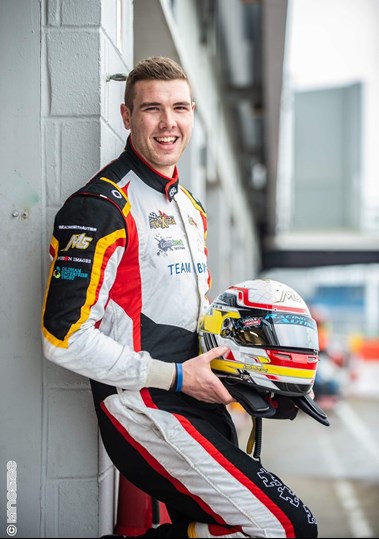Interview with racer, serial entrepreneur and autism ambassador, Matty Street
16 March 2022
Matty Street started up in business when he was 20, leading a management buyout of the carting track in Rochdale where he worked. Five years later, he runs five separate businesses, all linked to his first love, motorsport.
To mark this year's Neurodiversity Celebration Week, Matty who is a Hub client spoke with our Mentor Relationship Lead Andy Hall, about how he has refused to let his dyslexia, dyspraxia and autism stand in his way, and why you don’t always have to wear a tie.
Enjoying life in the fast lane

Hi Matty, could you tell us about you and your journey into entrepreneurship?
Having a social and a learning difficulty meant school was always a nightmare for me. I preferred more practical learning and had always had a love of motorsport, so in the end I went to University to study motorsports management and logistics.
While I was a student, I started working as a marshal at a track in Rochdale and 18 months later I was part of a management buyout that took over the carting track. Since then, I’ve started up four other businesses, all based around motorsports, and I race competitively too.
I’m currently working on my sixth venture which will be a graphics and vinyl company producing things like race car stickers. Essentially, we’ll be offering graphics for racing drivers by racing drivers.
How has being neurodiverse affected you as an entrepreneur?
I think one of the things it has helped me to do is make more calculated decisions. I can take the emotion out of an issue and just go with my gut feeling and intuition. It means I don’t get lost in the detail or doubt myself. If you think about things for too long, you can miss the moment – I call it ‘ready, fire, aim.’
Tell us about a recent challenge you’ve faced and how you overcame it.
Covid hit us hard. We had to close the track and I was used to travelling all over the country to race. I found the change of routine very hard and it was a mental struggle. But I’m not one to just sit around, so I launched a new business Extra Treats, to help us get through. It’s a shop that sells desserts and treats. Setting up a new brand, marketing it and coming up with a strategy helped me kill time and get through the various lockdowns. And we’re still running the business too, which is doing very well.
Do you think there are misconceptions about neurodiversity at work and what people think you can and cannot do?
Definitely. People presume that if you’re autistic you're not going to be very good at speaking in front of people. But I’ve delivered talks at conferences and spoken in front thousands of people. And that doesn’t just happen overnight, it takes a lot of confidence and a lot of self-belief. But just because someone says you can't do something doesn't mean they’re right.
It is so important to be yourself. I remember we had a meeting with some potential investors, and one of our team suggested I should wear a suit and tie. But I said no, if I do that, I'll be so self-conscious that I’m not going to be the best version of me. So, I went in jeans and a T-shirt, put forward our case and came away with the investment.
What tips would you give employers when it comes to supporting neurodivergent people?
I think businesses really need to make the whole recruitment process easier for people. When we recruit at entry level, I don’t really care what someone did at school or their academic achievements – I want to know what they’re like as a person.
So, everyone that applies for a job at the track is invited to come along for a chat. We order in pizzas, do a bit of carting and we basically cut through the awkwardness of the moment. People are nervous so over the course of a few hours we break down barriers so that people can put their best self across.
And for individuals themselves?
For someone who is neurodiverse and trying to find their first job, or just struggling to find their feet, my advice would be to just be yourself. The world is so much more accepting than what it used to be. When I was at school I didn’t really speak about my autism, but now I see it as my superpower if you like; I own it.
